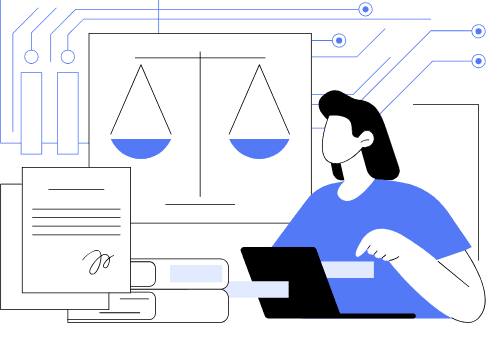🏛 Corporate Litigation Before High Court
Expert Legal Representation for Complex Business Disputes
Corporate litigation doesn't always end at tribunals. When matters escalate or involve constitutional, writ, or appellate jurisdiction, the High Court becomes the appropriate forum. At TAXAJ, we provide comprehensive representation for corporate entities and individuals navigating the intricate world of High Court litigation in business and company law matters.
🔍 What Constitutes Corporate Litigation Before High Court?
Corporate litigation before a High Court typically involves complex legal disputes or challenges arising from business operations, regulatory compliance, constitutional issues, or decisions made by statutory or quasi-judicial bodies. Unlike routine commercial disputes, these matters are often strategic and high-stakes, requiring interpretation of constitutional provisions, statutory laws, or review of lower tribunal decisions.
✅ Some of the Common Categories Include:
1. 🧾 Writ Petitions Under Article 226 of the Constitution
3. 🔐 Commercial Disputes Involving Government Contracts or State Entities
Where a business has a dispute with a public sector undertaking or state-controlled body, the High Court may be the appropriate forum, especially if the case involves large-value contracts, tenders, or breaches by authorities.
4. 📑 Intervention in Arbitral Proceedings
High Courts have supervisory jurisdiction under the Arbitration and Conciliation Act, 1996, including:
Setting aside arbitral awards (Section 34)
Appeals under Section 37
Appointment of arbitrators (Section 11)
5. 🚫 Challenging Blacklisting, Deregistration or Regulatory Orders
If a company is unfairly blacklisted, struck off, or penalized by a government or regulatory body without proper notice, recourse may lie before the High Court.
7. 🔍 Constitutional Challenges in Corporate Context
When a company seeks to challenge the constitutional validity of a law, circular, or regulation affecting its rights or business operations, the High Court is the competent forum under its writ and constitutional jurisdiction.
2. ⚖️ Appeals from NCLT, NCLAT, SAT, or SEBI Orders
While most corporate disputes originate before specialized tribunals like the NCLT or NCLAT, adverse decisions may be appealed before the High Court, particularly in matters involving:
Procedural irregularities
Violation of fundamental rights
Incorrect legal interpretation

6. 🏛 Civil Suits on the Original Side of the High Court
Some High Courts (Delhi, Bombay, Madras, Calcutta) have original civil jurisdiction for commercial suits exceeding a specified monetary value (as per the Commercial Courts Act, 2015). Corporates can directly institute suits here for:
Contractual breach
Misrepresentation/fraud
Intellectual property infringement
Enforcement of shareholder rights
📌 Key Takeaway:
Corporate litigation before a High Court is not merely procedural—it is often strategic, involving complex intersections of company law, constitutional law, and regulatory frameworks. High Courts act as guardians of fairness and legality, particularly where tribunals or regulators overstep or err in judgment.
⚖️ Legal Framework & Jurisdiction of High Courts
High Courts in India derive their authority from the Constitution of India and are empowered to adjudicate a wide range of corporate disputes—especially those involving fundamental rights, administrative overreach, or appeals from specialized tribunals.
Corporate litigation before High Courts is governed by a blend of constitutional, statutory, and procedural laws, depending on the nature of the dispute.
📜 1. Constitution of India – Article 226 & 227
Under Article 226, High Courts can issue writs (like mandamus, certiorari, prohibition, quo warranto, and habeas corpus) to enforce:
Fundamental rights
Legal rights where an authority acts illegally or arbitrarily
Under Article 227, the High Court can supervise the functioning of lower courts and tribunals.
✅ Example:
A company files a writ petition under Article 226 challenging SEBI’s order freezing its accounts without giving a proper hearing — alleging a violation of principles of natural justice.
📕 3. Arbitration and Conciliation Act, 1996
High Courts play a critical role in corporate arbitration matters:
Appointment of arbitrators (Section 11)
Interim reliefs (Section 9)
Challenge to arbitral awards (Section 34)
Appeals (Section 37)
✅ Example:
A multinational tech company seeks to set aside a ₹50 crore arbitral award passed against it, by filing a petition under Section 34 before the Delhi High Court.
📗 4. Commercial Courts Act, 2015
This Act designates certain benches of High Courts as Commercial Divisions for disputes involving commercial relationships (e.g., shareholder agreements, franchising, supply contracts) above a specified monetary value (₹3 crore in some jurisdictions).
Only specific High Courts (Delhi, Bombay, Calcutta, Madras) have original jurisdiction to entertain such commercial suits.
✅ Example:
A company files a breach of contract case involving ₹10 crores against a foreign vendor directly before the Bombay High Court’s commercial division.
📕 6. Insolvency & Bankruptcy Code (IBC), 2016
While NCLT handles insolvency proceedings, High Courts may:
Review violations of due process in IBC proceedings
Entertain challenges against government notifications under IBC
✅ Example:
A creditor challenges the vires (validity) of an IBC circular issued by the MCA restricting MSME claims, via writ petition before the Karnataka High Court.
📘 2. Companies Act, 2013
While most company-related disputes are heard by the NCLT/NCLAT, certain orders or procedural violations may still be challenged in the High Court under writ or appellate jurisdiction.
In rare cases, issues like constitutional challenges to provisions of the Companies Act, or overreach by the Registrar of Companies (ROC), are addressed directly before the High Court.
✅ Example:
A private limited company approaches the High Court to challenge the rejection of its share transfer filings by the ROC citing unconstitutional delay or arbitrary denial.

📘 5. SEBI Act, 1992 / SAT Orders
While appeals from SEBI go to Securities Appellate Tribunal (SAT), High Courts can be approached via writ jurisdiction if:
SAT’s order violates natural justice
Fundamental rights are infringed
✅ Example:
An investor group challenges a SEBI investigation order, alleging lack of jurisdiction and arbitrary conduct, via a writ petition before the Calcutta High Court.
🗺 Territorial & Subject-Matter Jurisdiction
Each High Court has jurisdiction over:
Cases arising within its territorial boundaries
Matters falling within its subject-matter competence (like company law, securities law, constitutional law, etc.)
For instance:
A writ against SEBI must be filed in a High Court within whose territory SEBI’s action affects the petitioner.
A commercial suit for breach of contract can only be filed in a High Court with original jurisdiction (e.g., Delhi, Bombay).
🧭 Summary
| Legal Basis | Scope in Corporate Matters |
|---|---|
| Article 226/227 – Constitution | Writ petitions & supervisory powers |
| Companies Act, 2013 | Company law procedural challenges, constitutional matters |
| Arbitration & Conciliation Act | Appeals, setting aside awards, interim measures |
| Commercial Courts Act | High-value contract and shareholder disputes |
| SEBI/RBI/IBC-related statutes | Review of regulatory action, SAT appeals, legal right enforcement |
🧾 Types of Corporate Litigation Before High Court.
Corporate litigation before the High Court involves a broad spectrum of legal disputes that typically fall outside the scope of regular tribunals or involve violations of constitutional or statutory rights. These cases are often complex and require interpretation of multiple laws, affecting the functioning, rights, or obligations of companies.
Below are the major types of corporate litigation that are commonly filed before High Courts:
1. ⚖️ Writ Petitions Against Government or Regulatory Action
Companies often approach the High Court under Article 226 of the Constitution to challenge arbitrary or illegal actions by government departments, regulatory authorities (like SEBI, RBI, ROC, MCA), or public sector undertakings.
✅ Example:
A company challenges the arbitrary cancellation of its GST registration without being given a hearing, claiming a violation of natural justice.
3. 🤝 Commercial Disputes Under Original Jurisdiction
In certain High Courts (e.g., Delhi, Bombay, Calcutta, Madras), original side jurisdiction is available for high-value commercial disputes (generally above ₹3 crore under the Commercial Courts Act, 2015).
These suits often involve:
Breach of contract
Specific performance
Misrepresentation or fraud
Enforcing commercial agreements
✅ Example:
A company sues a foreign supplier in the Delhi High Court for ₹8 crore for failure to deliver machinery under a supply agreement.
4. 📜 Challenging Blacklisting or Debarment Orders
Corporates blacklisted by government bodies or public sector undertakings without a proper hearing or due process may approach the High Court seeking quashing of such orders.
✅ Example:
An infrastructure firm files a writ petition in the Kerala High Court challenging its blacklisting from future tenders by a government agency.
5. 📩 Arbitration-Related Proceedings
High Courts handle critical matters under the Arbitration and Conciliation Act, 1996, including:
Appointment of arbitrators (Section 11)
Interim protection (Section 9)
Setting aside awards (Section 34)
Appeals (Section 37)
✅ Example:
A real estate company files a Section 9 petition in the Bombay High Court seeking an injunction against the encashment of bank guarantees during arbitration.
7. 🔐 Shareholder or Boardroom Disputes With Constitutional Implications
While NCLT deals with many shareholder disputes, cases involving breach of legal rights, procedural violations, or involvement of public bodies may be entertained by the High Court.
✅ Example:
A minority shareholder files a writ petition before the Calcutta High Court alleging denial of voting rights in a government-linked company.
9. 🔍 Interim Relief Applications in Urgent Situations
Companies often move High Courts seeking urgent interim relief such as:
Status quo orders
Stay on enforcement
Blocking unlawful actions
✅ Example:
A tech firm files a writ petition with an urgent interim injunction to stop the public release of a defamatory government report affecting its share value.
2. 🏢 Appeals Against Quasi-Judicial Orders
HC's are approached to appeal or challenge decisions passed by:
NCLT or NCLAT (in rare writ jurisdiction scenarios)
Securities Appellate Tribunal (SAT)
Adjudicating Authorities under FEMA or PMLA
✅ Example:
A listed company files a writ petition against a SAT order upholding a SEBI penalty, arguing procedural irregularities and lack of due process.

6. 📈 Constitutional Challenges Affecting Corporate Rights
Companies may challenge laws, rules, or notifications that are ultra vires or infringe constitutional rights like equality (Article 14) or freedom of trade (Article 19(1)(g)).
✅ Example:
A startup challenges an RBI circular restricting foreign investment in certain sectors, arguing it violates its fundamental right to carry on trade.
8. 🧾 Recovery & Enforcement of Regulatory Penalties
When penalties or orders imposed by regulatory bodies are challenged by companies, the High Court may step in to determine legality or enforceability.
✅ Example:
A foreign-invested company challenges a Foreign Exchange penalty by the Directorate of Enforcement before the Madras High Court.
10. 🏛 Miscellaneous Jurisdictional Issues
High Courts are often approached in cases involving:
Jurisdictional conflict between tribunals
Forum shopping allegations
Conflict of laws or regulations
✅ Example:
A company seeks the High Court’s opinion on whether a matter falls under the jurisdiction of NCLT or Consumer Forum, given overlapping regulatory issues.
📌 Conclusion:
High Courts offer broad judicial oversight, particularly in cases where:
There’s no alternate forum,
Fundamental or legal rights are violated, or
There’s urgency in granting relief.
Understanding the types of litigation permitted before High Courts helps companies navigate legal strategy effectively—particularly when regulatory or constitutional stakes are high.
🛠 How TAXAJ Assists in High Court Litigation
At TAXAJ, we understand that High Court litigation is often complex, time-sensitive, and strategically critical for businesses. Whether it involves regulatory overreach, constitutional violations, or high-stakes commercial disputes, we offer end-to-end legal support tailored to the needs of companies, promoters, directors, and stakeholders.
Here’s how TAXAJ assists you throughout the High Court litigation process:
🔍 1. Case Assessment & Strategic Consultation
Before filing any matter, we carry out a thorough assessment of:
The legal merit of your case
Alternative remedies (e.g., NCLT, SAT, Civil Court)
Applicable limitation periods and urgency
Risk mitigation and potential outcomes
✅ Example: Evaluating whether a client should challenge an RBI directive via writ petition or wait for a statutory appellate process.
📁 3. Document Compilation & Filing
We assist in compiling all necessary supporting documents:
Company resolutions and powers of attorney
Regulatory orders or notices
Communications with government authorities
Affidavits, annexures, indexes, and court fees
We also manage e-filing or physical submission as per the High Court’s rules.
🏛 4. Appearance & Representation
Our network of experienced advocates-on-record and arguing counsels appear before High Courts across India. We brief senior counsels where required and ensure:
Timely representation during hearings
Effective arguments and rebuttals
Application for urgent listings or interim reliefs
✅ Example: Seeking a stay order from Delhi High Court against coercive action by SEBI.
🛡 6. Regulatory Coordination
We coordinate and correspond with relevant regulatory bodies (e.g., SEBI, RBI, ROC, MCA) during the litigation to:
File representations
Seek clarifications or responses
Comply with directions where necessary
This ensures a parallel compliance strategy while the matter is sub judice.
📚 8. Real-Time Updates & Legal Briefings
Throughout the litigation, we maintain full transparency with our clients:
Timely status reports and next steps
Strategic suggestions during proceedings
Alerts for upcoming dates, deadlines, or new filings
🧩 9. Multidisciplinary Legal Expertise
High Court matters often touch multiple legal domains. TAXAJ’s team includes specialists in:
Corporate & commercial law
Taxation and FEMA
Arbitration & dispute resolution
Constitutional and administrative law
This ensures a holistic approach to every case.
📝 2. Drafting Petitions, Writs & Appeals
Our expert legal team drafts all pleadings and documents in line with:
Constitutional requirements (Art. 226, 227)
Relevant statutes like Companies Act, FEMA, SEBI Act, Arbitration Act, etc.
Procedural norms of the concerned High Court
We ensure the petition is precise, persuasive, and legally sound to withstand judicial scrutiny.
✅ Example: Filing a writ petition to quash a blacklisting order issued without giving the client an opportunity to be heard.

📦 5. Interim Relief & Emergency Filings
For matters requiring urgent intervention, such as:
Freezing of bank accounts
Suspension of licenses
Injunctions or stays against third-party actions
We prepare and move interim applications to safeguard your business interests immediately.
🔁 7. Post-Judgment Support & Enforcement
After the High Court issues its verdict, we provide complete post-litigation support:
Certified copy procurement
Compliance and execution of court orders
Filing review, clarification, or contempt petitions if needed
Advising on whether to escalate to the Supreme Court of India
✅ Example: Helping a client enforce a favorable High Court order that quashes a penalty imposed by SEBI.
🧾 10. Bespoke Litigation Packages
We offer customized service packages for:
Startups & SMEs
MNCs and Listed Companies
NBFCs & Fintechs
Family-owned businesses
Whether it's a single matter or ongoing litigation support, we tailor our engagement to your legal and financial goals.
📝 Checklist Before Filing in High Court (Corporate Litigation)
High Court litigation—especially involving corporate and commercial matters—is high-stakes, often time-sensitive, and must be approached with careful preparation. Filing prematurely or without proper documentation can weaken your case, delay proceedings, or even lead to dismissal.
Here is a comprehensive checklist that TAXAJ follows and recommends before initiating a case before the High Court:
✅ 1. Determine Jurisdiction
Territorial jurisdiction – Does the cause of action arise within the limits of the specific High Court?
Subject-matter jurisdiction – Is the matter appropriate for the High Court or should it go to NCLT, SAT, or another forum?
Original vs. Appellate side – Is it a fresh matter (e.g., writ petition) or an appeal/review of an existing tribunal order?
📌 Tip: For commercial suits above ₹3 crore (in original jurisdiction High Courts like Delhi, Bombay), ensure the Commercial Courts Act threshold is met.
✅ 3. Timeliness of Filing
Confirm you’re within limitation period as per:
Limitation Act, 1963
Special Acts (e.g., 90 days under Arbitration Act for setting aside awards)
If there is delay, prepare a condonation of delay application with justifiable reasons.
📌 Tip: Delay in filing writs must be explained with urgency or public interest angle.
✅ 4. Collect and Organize Documents
Board Resolutions/Authorization Letter/Power of Attorney
Communications with regulators, opposite parties, or authorities
Contracts, regulatory orders, or notices being challenged
All previous proceedings/orders from tribunals, if any
Evidence in support of claims (invoices, letters, screenshots, minutes of meetings, etc.)
📌 Tip: Ensure documents are properly paginated and signed by an authorized signatory.
✅ 6. Statutory Compliance Checks
Payment of appropriate court fees under relevant High Court rules
Filing of vakalatnama or appearance memo by the advocate
Inclusion of necessary compliance certificates (e.g., litigation history)
✅ 8. Verify Locus Standi
Ensure the petitioner has a direct stake in the dispute or has been affected by the impugned action.
Avoid filing through unauthorized representatives without clear power of attorney.
✅ 10. Engagement of Legal Counsel
Appoint experienced advocates-on-record or counsel with domain knowledge of commercial and corporate law
Where needed, prepare briefs for senior counsel or arguing counsel
Review drafts with your counsel thoroughly before final filing
✅ 2. Check for Alternative Remedies
Have all lower forums or specialized tribunals (like NCLT, SEBI, or SAT) been approached first?
Are you eligible to directly file a writ petition under Article 226 (e.g., for breach of natural justice, lack of alternate remedy)?
📌 Note: The High Court may refuse to hear a matter if alternate remedies have not been exhausted.

✅ 5. Drafting the Petition or Suit
Clear identification of parties (with CIN, PAN, address, etc.)
Jurisdictional averments
Chronology of facts
Legal grounds and constitutional/statutory violations
Reliefs sought
Interim prayer (if urgent relief needed)
📌 Tip: Attach an index, synopsis, list of dates/events, affidavit, and any required annexures.
✅ 7. Assess Interim Relief Strategy
If immediate restraint or status quo is required, prepare a separate Interim Application
Be ready to present urgency grounds before the registrar or court on the first hearing
📌 Tip: Include medical, financial, or reputational urgency if applicable.
✅ 9. Digital Filing/Portal Setup
Check if the High Court allows e-filing (most do)
Ensure digital signatures, scan quality, and document formats comply with court IT rules
BONUS: TAXAJ's Pro Filing Tips
✔ Maintain a master file with physical and digital copies of all documents
✔ Use a checklist-based approach to avoid last-minute errors
✔ Track next hearing dates, compliance deadlines, and follow-ups with a centralized litigation tracker
✔ Prepare for possible counterclaims or objections by anticipating the other side’s response
⚠️ Risks of Ignoring High Court Jurisdiction in Corporate Litigation
Ignoring the jurisdiction or authority of the High Court—whether inadvertently or deliberately—can have serious legal, financial, and reputational consequences for businesses. High Courts in India exercise constitutional, appellate, and original jurisdiction over a wide array of corporate, regulatory, and administrative disputes. Overlooking or bypassing their role may not only jeopardize your case but also create long-term legal complications.
Here’s an in-depth look at the risks of ignoring High Court jurisdiction:
1. ❌ Loss of Legal Remedies
High Courts are often the only forums where certain legal reliefs can be sought—such as:
Constitutional remedies under Article 226 (e.g., writs against government action)
Judicial review of quasi-judicial or regulatory authority decisions
Appeals against lower court or tribunal orders
👉 Risk: Ignoring this may result in irreversible loss of remedy due to expiration of limitation periods or absence of alternate forums.
3. ⚖️ Adverse Legal Precedent
If a company fails to contest an adverse order before the High Court, it may:
Become binding on the company in future litigation
Be cited by regulators or third parties as undisputed precedent
👉 Example: An unchallenged penalty order by SEBI or FEMA authority could severely impact future fundraising or M&A transactions.
4. 📑 Limited Scope of Redress in Lower Forums
Lower courts and tribunals are often bound by statutory limitations and lack constitutional powers. High Courts can:
Grant relief even in the absence of clear statutory provisions
Quash ultra vires actions
Interpret conflicting laws
👉 Risk: A tribunal may deny relief simply due to lack of authority, whereas the High Court may have provided a remedy.
5. 💼 Reputational & Commercial Fallout
Ignoring High Court options may signal:
Weak legal planning
Poor internal compliance
Inability to protect stakeholders' interests
This can affect:
Investor confidence
Shareholder relations
Public perception
👉 Example: A listed company that fails to challenge a High Court order branding it as a "habitual defaulter" could face reputational harm and stock devaluation.
7. 🚫 Dismissal by Supreme Court on Procedural Grounds
If a company directly approaches the Supreme Court without first going through the High Court (where appropriate), the petition may be:
Outright rejected for skipping a mandatory stage
Sent back to High Court, causing delay and duplication of efforts
2. 🕒 Delay in Justice and Escalation of Dispute
Delaying or bypassing High Court proceedings can:
Allow the opposite party to act unchecked
Escalate regulatory penalties
Cause irreversible commercial damage
👉 Example: Failing to file a timely writ against a blacklisting order could lead to contract cancellations, reputation loss, and being debarred from future bids.

6. 📉 Enforcement Risks & Coercive Actions
Failure to approach the High Court in time can result in:
Freezing of bank accounts
Cancellation of licenses or registrations
Attachment of company property
Arrests or director disqualifications (in extreme cases)
👉 Example: Ignoring a High Court stay option in a GST fraud matter could lead to criminal proceedings and director travel restrictions.
8. 🔐 Loss of Interim Relief Opportunities
High Courts often have the power to:
Grant stay on recovery
Injunct publication of defamatory material
Stop coercive actions
👉 Risk: Ignoring High Court jurisdiction means you might miss the chance for crucial interim protection, leaving your business exposed to irreversible damage.
📌 Conclusion:
The High Court is not just a higher court—it's a critical constitutional pillar in safeguarding corporate rights, ensuring due process, and correcting errors of lower authorities. Overlooking its jurisdiction is not a minor procedural lapse; it’s a strategic blunder that can cost companies heavily—in litigation success, financial stability, and long-term business continuity.
💼 Industries We Frequently Represent
At TAXAJ, we provide tailored legal solutions across a diverse array of industries, each with its own regulatory challenges, litigation patterns, and strategic requirements. Our team combines legal expertise with deep sectoral knowledge to offer industry-specific litigation and compliance support—especially in High Court, NCLT, and other regulatory forums.
Here’s an overview of the industries we most commonly serve:
🏢 1. Real Estate & Construction
We assist developers, construction firms, REITs, and landowners with:
Title disputes and specific performance suits
RERA litigation and arbitration
Contractual enforcement (EPC, PMC agreements)
Regulatory approvals and land use litigation
✅ Example: Challenging arbitrary project cancellation by local authority via writ petition.
🧬 3. Healthcare, Pharma & Biotechnology
We represent hospitals, pharma companies, and diagnostic chains in:
IP disputes and injunctions (drug formulation, patent violations)
Regulatory challenges (DCGI, CDSCO, NPPA orders)
Medical negligence defence
M&A regulatory approvals (FIPB, NCLT)
✅ Example: Filing a writ against wrongful suspension of a drug manufacturing license.
🖥️ 4. IT, SaaS & Tech Startups
We provide comprehensive support on:
Shareholder, founder, and IP disputes
Data privacy and intermediary liability defence
Service-level agreement enforcement
Employee stock option (ESOP) or buyback disputes
✅ Example: Seeking an injunction in High Court against ex-founders misusing trade secrets.
🛍️ 6. Retail, FMCG & Franchise Networks
Our legal support includes:
Disputes with vendors, franchisees, or distribution partners
Consumer complaints and class actions
Product liability defence
Trademark protection and anti-counterfeiting litigation
✅ Example: Challenging Food Safety Department orders in High Court affecting product circulation.
✈️ 8. Aviation, Logistics & Infrastructure
We advise airlines, cargo companies, and logistics tech firms on:
Airport concession or PPP contract disputes
Customs, DGCA or environmental regulation challenges
Aircraft lease or ground handling litigation
Injunctions related to force majeure events
✅ Example: Filing a writ to stay coercive demurrage charges at port during lockdown.
⚙️ 10. Manufacturing & Industrial Enterprises
Support in:
Environmental compliance (CPCB/SPCB) litigation
Labour law and contract labour issues
Licensing & industrial zoning disputes
Contractual breach and supplier defaults
✅ Example: Filing for quashing of pollution board closure notices in High Court.
💳 2. Banking & Financial Services (NBFCs & FinTechs)
Our services cover:
Debt recovery proceedings under SARFAESI, DRT & NCLT
Cheque bounce and loan default litigation
Writs against regulatory actions (RBI, FIU, ED)
Enforcement of mortgage and collateral agreements
✅ Example: Filing High Court writs to unfreeze bank accounts wrongfully attached in PMLA proceedings.

🎬 5. Media, Advertising & Entertainment
From digital content platforms to traditional media houses, we help with:
Copyright and brand protection injunctions
Talent contract disputes and defamation litigation
Broadcasting license and TRAI compliance matters
OTT, licensing and content takedown disputes
✅ Example: Injunction before High Court to stop unauthorized broadcast of copyrighted material.
🏦 7. Private Equity, Venture Capital & Investment Funds
We support funds and investors in:
Shareholder and exit-related disputes
Enforcing rights under Shareholders/Investment Agreements
NCLT remedies for oppression & mismanagement
Regulatory advisory for FDI/FEMA violations
✅ Example: Representation in disputes related to valuation manipulation or delayed exits.
🔌 9. Energy, Power & Renewables
We work with power generators, DISCOMs, and EPC companies on:
PPA and power supply agreement enforcement
Tariff order disputes and appeals
EPC contract litigation and arbitration
Regulatory clearances before High Courts or APTEL
✅ Example: Writ petition to quash retrospective tariff revisions impacting project viability.
🛡 Why Industry Expertise Matters in Litigation
Each sector operates under distinct laws, regulators, and business realities. Our industry-specific approach ensures:
Faster strategy formulation
Effective interpretation of technical contracts
Relevant case law application
Stronger arguments before courts and regulators
🔁 Appeals from Quasi-Judicial Bodies
In the complex legal and regulatory ecosystem of India, quasi-judicial bodies play a critical role in resolving disputes and enforcing compliance. However, their decisions are not always final—they can be appealed before the High Court, NCLT, NCLAT, or even the Supreme Court, depending on the nature of the matter and governing statute.
At TAXAJ, we specialize in representing clients in such appellate matters—helping businesses challenge unjust decisions or defend favorable outcomes issued by these authorities.
📌 What are Quasi-Judicial Bodies?
Quasi-judicial bodies are institutions or regulators that have powers similar to a court but operate within a limited domain and follow specialized statutes. These bodies are empowered to:
Conduct hearings
Evaluate evidence
Pass enforceable orders
Common examples include:
NCLT (National Company Law Tribunal)
SEBI (Securities and Exchange Board of India)
RBI Adjudicating Officers
DRT (Debt Recovery Tribunal)
ITAT (Income Tax Appellate Tribunal)
SAT (Securities Appellate Tribunal)
Competition Commission of India (CCI)
🧾 Grounds for Appeal
Appeals may be filed against the decision of a quasi-judicial authority based on grounds such as:
Violation of principles of natural justice
Error of law or interpretation
Lack of jurisdiction
Failure to consider material evidence
Arbitrariness or abuse of power
📂 Types of Matters Commonly Appealed
👉 Rejection of schemes under Companies Act (NCLT → NCLAT)👉 Penalties by SEBI or RBI (→ SAT/High Court)👉 Compounding orders by Income Tax or FEMA authorities👉 M&A control orders by CCI👉 Rejection of CIRP under IBC👉 Suspension of licenses or deregistration by regulators
🏛️ Forums for Appeal (Examples)
| Quasi-Judicial Body | Appellate Forum |
|---|---|
| NCLT | NCLAT → Supreme Court |
| SEBI | SAT → Supreme Court |
| DRT | DRAT → High Court |
| ITAT | High Court |
| CCI | NCLAT → Supreme Court |
| Adjudicating Officer (RBI/FEMA) | High Court |
⚖️ Legal Framework for Appeals
The appeals are governed by:
Companies Act, 2013 (Section 421, 423)
SEBI Act, 1992 (Section 15T)
FEMA, 1999 (Section 35)
Income Tax Act, 1961 (Section 260A)
Constitution of India (Article 226/227 for Writs)
Each statute prescribes:
Time limits (typically 30–90 days)
Format and structure of the appeal
Requirement of certified copies
Conditions for stay/interim relief
📈 Why Timely Appeals Matter
Ignoring or delaying an appeal from a quasi-judicial body can:
Make the adverse decision final and binding
Affect business operations, credit ratings, or compliance history
Result in irreversible penalties, disqualifications, or deregistration
📋 Challenges in Appeal Process
🛠 How TAXAJ Assists in Appeals
Our experienced team provides full-cycle appellate support, including:
Drafting appeal petitions, grounds of challenge, and annexures
Filing condonation of delay applications, if needed
Filing stay/interim relief applications
Strategic advice on forum selection (NCLAT, High Court, Supreme Court)
Representation through senior advocates and domain experts
Post-judgment compliance and enforcement support
🛡 Interim Relief & Stay Orders
In the fast-paced world of corporate and commercial litigation, time is often of the essence. Before a final verdict is passed, parties may need urgent protection to preserve their rights or prevent irreparable harm. That’s where interim relief and stay orders play a critical role.
At TAXAJ, we specialize in strategically securing interim reliefs and stay orders for clients before courts and tribunals—ensuring that ongoing litigation doesn’t result in avoidable damage or disruption.
📌 What is Interim Relief?
Interim relief refers to a temporary order issued by a court or tribunal while the main case is still pending, to:
Protect the interests of either party
Maintain the status quo
Prevent irreparable harm
Avoid multiplicity of proceedings
👉 It acts as a legal shield until the final decision is made.
🔍 When is Interim Relief Granted?
Courts typically consider the following tests before granting interim relief:
Prima Facie Case – There is a strong initial case in your favor.
Irreparable Harm – Harm that cannot be undone by monetary compensation.
Balance of Convenience – Granting relief won’t disproportionately harm the other side.
Urgency & Public Interest – Especially in public law or regulatory matters.
✅ Example: A company files a writ to stay cancellation of its import license due to an arbitrary customs order that would otherwise shut down its supply chain.
📜 Legal Framework in India
🚨 Risks of Not Seeking Interim Relief
🔚 Conclusion
Interim relief is the safety net of litigation. Without it, legal victories may come too late to matter. At TAXAJ, we combine litigation insight with procedural precision to ensure your rights are safeguarded from day one—through well-argued and promptly secured interim protections.
⚖️ Types of Interim Reliefs
Some common types of interim orders include:
Stay Orders – Temporarily halting execution of a lower court/tribunal order or administrative action.
Temporary Injunctions – Restraining a party from performing an act that may cause harm.
Attachment Before Judgment – Freezing of property/assets to ensure recovery if the suit succeeds.
Interim Compensation – Provisional financial relief in cases like employment or consumer disputes.
Status Quo Orders – Preserving existing conditions (e.g., shareholding, possession, directorship).
Interim Custody or Receiver Appointments – To take control of disputed assets during the case.

📚 Example Case Study
✅ Proactive Interim Strategy
Getting interim relief is not just about urgency, but also:
Timing of filing
Supporting documents (affidavits, notices, email chains)
Framing legally persuasive pleadings
Tailoring relief to the facts of the case
🕒 Timelines & Procedural Complexity
When it comes to corporate litigation—whether before the High Court, NCLT, or other quasi-judicial forums—timelines and procedural requirements play a critical role in determining the success and efficiency of your legal strategy.
At TAXAJ, we help businesses and stakeholders navigate the complex legal processes, meet statutory timelines, and avoid costly procedural pitfalls that can weaken your case or lead to outright dismissal.
📅 Statutory Timelines You Must Know:
Each forum and statute imposes strict time limits for filing petitions, appeals, and applications. Failing to adhere can bar your right to legal recourse or significantly weaken your position.
| Nature of Action | Forum | Timeline |
|---|---|---|
| Filing an Appeal from NCLT to NCLAT | NCLAT | 45 days (extendable by 45) |
| Appeal from NCLAT to Supreme Court | Supreme Court | 60 days |
| Writ Petition Against Regulatory Orders | High Court | Reasonable time (preferably within 90 days) |
| Section 7 IBC Petition (Financial Creditor) | NCLT | No specific limit, but delay affects maintainability |
| Section 138 NI Act (Cheque Bounce) Complaint | Magistrate Court | Within 30 days of cause of action |
| Appeal to DRAT from DRT | DRAT | 45 days |
| Application for Compounding of Offence | ROC/NCLT | At earliest upon default |
✅ Note: Delay beyond the prescribed limit typically requires a condonation of delay with sufficient cause.
⚙️ Procedural Complexity: Why It Matters
Many litigants underestimate how complex, multi-stage, and document-intensive legal proceedings can be—especially in corporate matters involving:
Regulatory bodies (SEBI, RBI, MCA)
Financial claims (IBC, SARFAESI)
Contract enforcement and shareholder disputes
Oppression & mismanagement cases
Mistakes in procedure can lead to:
Dismissal on technical grounds (not merits)
Delays in grant of interim relief
Loss of jurisdiction
Adverse costs or directions from the court
🛠 How TAXAJ Helps You Navigate the Process
✅ Summary
In corporate litigation, substance and procedure go hand in hand. No matter how strong your legal case may be, failure to meet timelines or follow correct procedure can completely derail your efforts.
With TAXAJ’s expertise, we ensure:
Every filing is accurate and timely
Every procedural step is handled with precision
Every legal opportunity is pursued to your advantage
📋 Examples of Procedural Hurdles

📈 Why Timeliness Is Strategic
📌 When to Choose High Court Over NCLT or Civil Court
In India’s multifaceted legal landscape, deciding where to initiate litigation—whether before the High Court, NCLT (National Company Law Tribunal), or Civil Court—is crucial and often dictates the speed, scope, and outcome of the case. While NCLT and Civil Courts handle a broad range of corporate and civil matters, the High Court is often the forum of choice for urgent, high-stakes, or constitutional challenges.
At TAXAJ, we advise and represent clients strategically by helping them determine the most suitable legal forum based on the nature, complexity, and urgency of their dispute.
🏛️ Jurisdiction Overview
| Forum | Jurisdiction |
|---|---|
| NCLT | Corporate disputes under Companies Act (e.g., insolvency, oppression & mismanagement, mergers, demergers, company law compliance) |
| Civil Court | Personal, property, or contract-related civil disputes not barred by special statutes |
| High Court | Constitutional issues, writs, statutory appeals, complex commercial disputes, and supervisory jurisdiction over lower tribunals |
✅ Scenarios Where High Court is the Better Choice
✅ Strategic Tip
Choosing the wrong forum (e.g., filing a writ instead of appealing to NCLAT) can waste critical time, money, and credibility. That’s why strategic forum selection, based on facts, relief sought, and urgency, is not a legal formality—it’s a tactical advantage.
🚫 When NOT to Choose the High Court

⚖️ Legal Basis
🛠 TAXAJ’s Role
We help clients:
Assess whether High Court jurisdiction is maintainable
Draft and file Writ Petitions, Civil Appeals, and Revision Petitions
Seek urgent interim relief or stay
Ensure all procedural safeguards are met (notice, affidavits, limitation)
Coordinate with Senior Advocates and High Court specialists
📚 Precedents Set by High Courts in Corporate Law
High Courts across India play a pivotal role in shaping the contours of corporate law. Through their constitutional powers under Articles 226 and 227, and their appellate/supervisory jurisdiction over tribunals and statutory bodies, High Courts have consistently set landmark precedents that influence corporate governance, regulatory compliance, shareholder rights, contractual obligations, and the enforcement of statutory provisions.
At TAXAJ, we track and leverage these judicial precedents to frame arguments, interpret legal ambiguities, and guide strategic litigation in complex corporate matters.
🔍 Landmark High Court Judgments in Corporate Law
🛠 How TAXAJ Uses Precedents in Litigation
We analyze forum-specific case laws to build strong, precedent-based pleadings.
We cite favorable High Court rulings to obtain interim reliefs or quash arbitrary regulatory action.
We draft petitions and replies that align with judicial reasoning upheld by relevant High Courts.
We track emerging trends to inform our clients of potential risks or favorable interpretations.
⚖️ Why High Court Precedents Matter in Corporate Law
✔️ They offer binding authority (within the state) and persuasive
✔️ Their decisions often form the basis for appeals to the Supreme

📌 Precedents Related to Shareholder Rights
📋 Precedents Shaping Corporate Governance & Board Decision
🧠 Why This Matters to You
Understanding High Court precedents helps:
Anticipate likely judicial outcomes in corporate litigation
Structure deals and contracts that mitigate legal exposure
Make informed decisions on whether to litigate, settle, or escalate
📋 Required Documents for High Court Filings
Filing a case before the High Court, particularly in corporate litigation, involves meticulous preparation of documents to ensure admissibility, maintainability, and procedural compliance. The High Court follows strict procedural standards, and any error or omission can delay proceedings or even lead to dismissal on technical grounds.
At TAXAJ, we help clients prepare a comprehensive, court-compliant filing docket tailored to the nature of the petition—whether it's a writ petition, company appeal, civil revision, or arbitration-linked challenge.
🗂️ Common Document Requirements Across Matters
| Document | Purpose |
|---|---|
| Petition or Writ Petition | Main legal document stating facts, grounds, and relief sought |
| Affidavit in Support | Sworn statement verifying facts of the petition |
| Annexures / Exhibits | Supporting documents (contracts, emails, orders, resolutions, etc.) |
| Index of Documents | Chronological list of all enclosed papers and annexures |
| Vakalatnama / Power of Attorney | Authorizes advocate to appear on behalf of the petitioner/respondent |
| Memorandum of Parties | Complete names, addresses, and designations of all parties involved |
| Court Fee Receipt | Proof of payment of applicable court fees |
| Cover Page & Synopsis | Title page and concise summary of the case |
| Brief of Arguments (optional) | For complex matters, a written summary of legal contentions |
📝 Case-Specific Documents
▶️ In Corporate Contractual Disputes
Master Service Agreement / MoU / Shareholder Agreement
Payment invoices and ledgers
Email chains and WhatsApp screenshots
Legal notices and replies
▶️ In Writ Petitions Against Regulatory Authorities
Copy of the impugned order or show-cause notice
Correspondence with the authority
Statutory provisions challenged (with annotations)
Evidence of jurisdiction or urgency
▶️ In Arbitration-Related Petitions
Copy of arbitration agreement or clause
Statement of claim and counterclaim
Arbitral award (if applicable)
Evidence of misconduct or procedural violation
▶️ In Company Law Appeals / Revisions
Certified copy of NCLT/NCLAT order
Board resolutions authorizing filing
Company incorporation documents (COI, AOA, MOA)
List of shareholders or creditors
⚠️ Risks of Improper Documentation
📌 Pro Tip from TAXAJ
Always retain at least three sets of your filing documents—one for court, one for the opposite party, and one for your own records—with digital backups. Court rules often change, so staying updated and organized ensures your case is never derailed due to paperwork.
🔍 Additional Documents (As Needed)
✔️ Authorization from shareholders or Board
✔️ Translation of vernacular documents (if filed in regional languages)
✔️ Interim relief applications with supporting urgency affidavit

🛠 How TAXAJ Ensures Seamless Filing
🔐 Post-Judgment Support & Add-on Services Offered by TAXAJ
Securing a favorable judgment is only part of the journey. True success in corporate litigation lies in the effective execution and enforcement of that judgment, along with the strategic actions taken afterward. At TAXAJ, our services go beyond courtroom representation—we support our clients post-verdict with full-spectrum assistance, ensuring legal victory translates into tangible results and ongoing compliance.
🔐 Post-Judgment Support
Our Post-Judgment services include everything needed to enforce, monitor, and comply with the court’s directions:
✅ 1. Execution of Decrees & Orders
Filing execution petitions before the appropriate courts to recover awarded amounts or enforce specific performance.
Liaising with authorities for attachment of properties, garnishee orders, or injunctions on assets.
Monitoring timelines for compliance by the opposing party, including periodic follow-up.
✅ 2. Compliance & Implementation Guidance
Step-by-step advisory for complying with court-mandated actions such as:
Corporate disclosures
Public notices
Board/shareholder resolutions
Statutory filings (ROC, RBI, SEBI, etc.)
Ongoing regulatory compliance post-judgment to avoid contempt or penalties.
✅ 3. Contempt Proceedings (If Needed)
Drafting and filing contempt petitions in cases where the opposite party fails to follow High Court orders.
Legal strategy for proving willful disobedience of the court and seeking punitive remedies.
✅ 4. Appeal Management & Strategy
Advisory on whether to file an appeal or defend against an appeal at the Division Bench, NCLAT, or Supreme Court.
Drafting Review Petitions, Letters Patent Appeals (LPA), or Special Leave Petitions (SLP) with proper procedural framing.
✅ 5. Settlement Enforcement / Out-of-Court Terms
Ensuring parties fulfill agreed settlement terms post-judgment.
Drafting and notarizing compromise agreements, release deeds, and final payment acknowledgements.
📌 With TAXAJ, You Get:
End-to-end execution and advisory
A team that’s familiar with the entire litigation lifecycle
Protection from future liabilities through proper documentation and compliance
A partner that doesn’t stop at judgment—we walk with you beyond the verdict
🎯 Add-on Services Offered by TAXAJ
We help clients maximize their legal outcomes with value-added strategic, documentation, and compliance support:
📁 1. Documentation & Agreement Drafting
Fresh contracts or MoUs post-resolution
Revised vendor agreements, shareholder arrangements, or employment contracts in line with court directions
Legally vetted NDAs, IP assignments, or restructuring documents
🧾 2. Regulatory Filing Support
Filing of Form INC, MGT, PAS, SH, and GNL forms with MCA
RBI/SEBI reporting post-court orders involving foreign investment, compounding, or shareholding change
Updating PAN, GST, and Income Tax records
💼 3. Corporate Governance Audit
Conducting post-litigation legal audits to uncover compliance lapses that triggered litigation
Recommendations for boardroom practices, disclosures, and statutory filings
🛡 4. Policy Advisory & Risk Mitigation
Drafting risk control SOPs, legal checklists, and internal frameworks
Training board members and management on legal duties and preventive measures
📊 5. Litigation Analytics & Reporting
Post-litigation analysis on:
Risk exposure
Cost-benefit summary
Legal precedents cited
Strategic gaps and corrective measures
🧠 Why Post-Judgment Support Matters
Why Choose Us?
At TAXAJ, we approach Litigative matters with a unique blend of legal expertise, emotional intelligence, and procedural precision. Such matters are highly sensitive and complex, requiring not just legal capability but also deep empathy, discretion, and smart advocacy. Here's why clients trust TAXAJ:
Consult us today to protect your legal rights and move forward with confidence.
✅ Protect Your Rights, Claim What's Rightfully Yours
If your company is going through any sort of Turbulence, don’t absorb the loss in silence. Let TAXAJ help you pursue the compensation you deserve, with a legally strategic and commercially sound approach.
💬 Schedule a consultation today to discuss your damages or breach claim.

